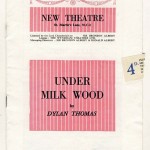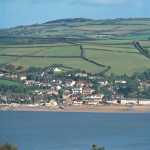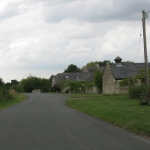Last week marked sixty years since Under Milk Wood opened in the New Theatre in London’s West End. This original piece captivated and amazed (or shocked– dependent on the audience) the crowds, in equal measure. Many regard Dylan’s ‘play for voices’, as his ‘pièce de résistance’. It was finished – well, in as much as his work was every completed – just months before his death, and was the accumulation of years of experimenting and playing with language.

Though, interestingly, what people often want to discuss with me is Llareggub – the setting of the play – the fictional town that is full of quirky characters, and eye-raising behaviour. “Where is it?” they ask.
So, let’s take a closer look.
Could it be New Quay in West Wales? Well, when based there, my grandfather did write a radio play, “Quite Early One Morning’, which featured a few of the Under Milk Wood characters. There’s also Dylan’s pencil sketch of Llarreggub that bares a remarkable resemblance to the town.


Or, how about the Welsh villages: Ferryside and Llansteffan? He visited them often, as both a child and adult, and certainly would have absorbed the atmosphere of the communities, and met a few of the local characters in the pubs.


And then there’s Laugharne, his final home. He knew the town well, including, the interesting goings on! He frequently shared gossip with the landlady of the Brown’s Hotel or sat in the cove by the large bay window, and spied on the pub regulars, scribbling notes on the back of woodbine packets.

South Leigh in Oxfordshire and Bletchley Park, the home of British code breaking, are also contenders for the prize, though, admittedly, weaker entries.

But where do I think it’s based on? Now, that would be telling. I couldn’t possibly say. I’ll just have to leave it to you to decide on that one. I’d love to hear your thoughts though, and, any suggestions you may have too.
Now, it’s only in more recent years, (though Laugharne did cotton on much earlier), that these places have seen the potential of Under Milk Wood as a driving force for tourism. To be honest, though they undoubtedly market the Dylan Thomas brand, I’m a little surprised they don’t do more. The popularity of literary tourism is growing, and rapidly. My instinct is that the reason for this, apart from the obvious financial costs of creating such a thing as a “Where is Llareggub” trail (just thinking out loud here), is that these towns are being cautious. I wonder if, understandably, they feel a little unsure about whether Under Milk Wood was Dylan’s way of poking fun at them. Many locals in these towns have family members that knew Dylan. It’s all still very close to home.
But, do you know what I think. My grandfather loved the places I’ve talked about, and he especially liked the eccentric locals that became his friends. They were ordinary people – flaws ‘n’ all…not ‘wholly bad or good’. They were human, very human indeed, and that’s what my grandfather liked about them and that was what he was celebrating in his writing.
Just read the letter at the bottom of this blog post and you’ll see exactly what I mean.
Before I finish, I just want to touch on the rich language that oozes out of Under Milk Wood. Critics have called my grandfather’s writing ‘flowery’ or worse, the academic and author; Kingsly Amis described it as– “Frothing the mouth like piss.” (The Welsh phrase ‘Ach a fi!’ is the only way I can respond to that!) Yet, that could not be further from the truth. Every word and phrase in my grandfather’s writing, and Under Milk Wood encapsulates it all, has been given meticulous thought and care. Not one word has been left to chance.


“It is Spring, moonless night in the small town, starless and bible-black, the cobblestreets silent and the hunched, courters’-and- rabbits’ wood limping invisible down to the sloeblack, slow, black, crowblack, fishingboat-bobbing sea. The houses are blind as moles (though moles see fine to-night in the snouting, velvet dingles) or blind as Captain Cat there in the muffled middle by the pump and the town clock, the shops in mourning, the Welfare Hall in widows’ weeds. And all the people of the lulled and dumbfound town are sleeping now.”
Does that paragraph not say it all?
If you’ve not yet discovered, or are rediscovering, Under Milk Wood, I’d like to pass on some advice from my grandfather. “Love the words, love the words.”


![]()
Hannah Ellis – 26th September 2016.
Hannah is a teacher, writer and consultant. You can learn more about her by visiting the website – http://www.hannahellisconsultancy.com
Letter from Dylan to Princess Caetani
“Let me particularise, and at random. As the piece goes on, two voices will be predominant: that of the preacher, who talks only in verse, and that of the anonymous exhibitor and chronicler called, simply, 1st Voice. And the 1st Voice is really a kind of conscience, a guardian angel.
Through him you will learn about Mr Edwards, the draper, and Miss Price, the seamstress, and their odd and, once it is made clear, most natural love. Every day of the week they write love letters to each other, he from the top, she from the bottom, of the town: all their lives they have known of each other’s existence, and of their mutual love: they have seen each other a thousand times, and never spoken: easily they could have been together, married, had children: but that is not the life for them: Their passionate love, at just this distance, is all they need. And Dai Bread the baker, who has two wives: one is loving and mothering, sacklike and jolly; the other is gypsy slatternly and, all in love, hating: all three enjoy it. And Mrs Ogmore Pritchard who, although a boardinghouse keeper, will keep no boarders because they cannot live up to the scrupulous and godlike tidiness of her house and because death can be the only boarder good enough for her in the end. And, Mr Pugh, the schoolmaster, who is always nagged by his wife and who is always plotting her murder. This is well known to the town, and to Mrs Pugh. She likes nagging; he likes plotting, in supposed secrecy, against her. He would always like plotting, whoever he lived with; she would always like nagging, whoever she lived with. How lucky they are to be married. And Polly Garter has many illegitimate babies because she loves babies but does not want only one man’s. And Cherry Owen the soak, who likes getting drunk every night; and his wife who likes living with two men, one sober in the day, one drunk at night…And so with all of them, all the eccentrics whose eccentricities, in these first pages, are but briefly and impressionistically noted: all, by their own rights, are ordinary and good; and the 1st Voice, and the poet preacher, never judge or condemn but explain and make strangely simple and simply strange.”


On a bluff above the town of Laugharne sits a large wooded area which acts as an umbrella over the town. It was owned by a Mr. Milk and used to be referred to as Milk’s Wood. Hence my belief (and that of George Tremlett, the writer and biographer of books on both Dylan and Caitlin Thomas and owner of Corran Books in Laugharne) that Under Milk Wood is based most centrally on the village of Laugharne. (About which Dylan Thomas wrote much more than any other locale save his birth place of Swansea.
Hi Robert, Thanks for sharing your thoughts. It all helps answer the question, “Where is Llareggub?” Best wishes, Hannah